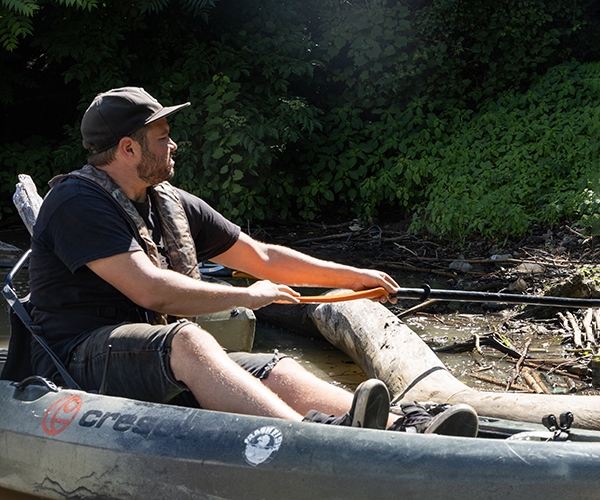Michael Scharf couldn’t believe the call he got from the U.S. Embassy in Iraq: American officials wanted him to help prepare the Iraqi judges who would put Saddam Hussein on trial.
It was a prestigious invitation — but it put Scharf in a painful position. The Case Western Reserve University law professor had opposed the invasion of Iraq. He’d said publicly that the Iraqi court formed to try crimes against humanity would be perceived as a puppet of an occupying power.
“My initial reaction was, I don’t want to have anything to do with this,” recalls Scharf, director of Case’s Frederick K. Cox Center for International Law. But the embassy staffer knew how to convince him.
“You can sit on the sideline and hurl criticism at us,” Scharf recalls him saying. “Or you can get involved to make this the most fair, most successful trial possible.”
That got to Scharf. “It’s always better to try to get involved than play it safe on the sidelines,” he says. For 20 years, he’s worked to revive the idea that the world has the power to punish torture and genocide. As a State Department lawyer in the early 1990s, he helped create the court that tried war criminals from the former Yugoslavia. Ever since, he and his students have helped shape the courts and laws that have put many others on trial.
So Scharf, who joined Case in 2002, became a legal adviser for the Saddam Hussein trial — the subject of his new book, Enemy of the State (St. Martin’s Press, $26.95), published in September. In 2004, Scharf traveled to London and Stratford-upon-avon and instructed 42 Iraqi judges in how courts have punished atrocities in the former Yugoslavia, Rwanda and Sierra
Leone. During the trial, 18 of Scharf’s Case students served as unofficial clerks, writing long legal memos for the judges. The court’s 300-page judgment finding Saddam guilty of crimes against humanity was filled with citations of other war-crimes cases —an important document, written in Arabic, for judges throughout the Middle East. “I don’t think any of that would have happened if not for our memos,” Scharf says.
Though his work confronts the world’s worst crimes, from torture to child slavery, Scharf exudes an energetic optimism and an almost mischievous excitement. As he explains how to bring war criminals to justice, his ruddy, cherubic face often breaks into a smile.
Across the table, he passes photos from his fall trips to Uganda and Cambodia. Each shows him smiling. In Cambodia —where he advised judges on how to cope with the disruptive tactics of defense lawyers for alleged architects of the 1970s “killing fields” — Scharf poses, grinning, with two Case law student interns inside Cambodia’s special war-crimes courtroom. In Uganda, where he critiqued a draft bill to set up a war-crimes court to try murderous rebel leaders, he looks bemusedly at a monkey on his picnic table, and he poses, beaming happily, with a prominent judge.
That smile, Scharf’s hint that pursuing justice is a thrill, returns when he discusses his next book, International Law in Crisis, which will examine the U.S. government’s shifting attitudes toward his field. It sharply critiques the Bush Administration’s legal memos that justified aggressive interrogations of war-on-terror detainees, including the procedure of waterboarding.
Scharf says the lawyers responsible for those opinions should avoid visiting several countries that might arrest them on charges of violating a key torture treaty. “I think there’s a legal case that they committed crimes,” he says.
It was a prestigious invitation — but it put Scharf in a painful position. The Case Western Reserve University law professor had opposed the invasion of Iraq. He’d said publicly that the Iraqi court formed to try crimes against humanity would be perceived as a puppet of an occupying power.
“My initial reaction was, I don’t want to have anything to do with this,” recalls Scharf, director of Case’s Frederick K. Cox Center for International Law. But the embassy staffer knew how to convince him.
“You can sit on the sideline and hurl criticism at us,” Scharf recalls him saying. “Or you can get involved to make this the most fair, most successful trial possible.”
That got to Scharf. “It’s always better to try to get involved than play it safe on the sidelines,” he says. For 20 years, he’s worked to revive the idea that the world has the power to punish torture and genocide. As a State Department lawyer in the early 1990s, he helped create the court that tried war criminals from the former Yugoslavia. Ever since, he and his students have helped shape the courts and laws that have put many others on trial.
So Scharf, who joined Case in 2002, became a legal adviser for the Saddam Hussein trial — the subject of his new book, Enemy of the State (St. Martin’s Press, $26.95), published in September. In 2004, Scharf traveled to London and Stratford-upon-avon and instructed 42 Iraqi judges in how courts have punished atrocities in the former Yugoslavia, Rwanda and Sierra
Leone. During the trial, 18 of Scharf’s Case students served as unofficial clerks, writing long legal memos for the judges. The court’s 300-page judgment finding Saddam guilty of crimes against humanity was filled with citations of other war-crimes cases —an important document, written in Arabic, for judges throughout the Middle East. “I don’t think any of that would have happened if not for our memos,” Scharf says.
Though his work confronts the world’s worst crimes, from torture to child slavery, Scharf exudes an energetic optimism and an almost mischievous excitement. As he explains how to bring war criminals to justice, his ruddy, cherubic face often breaks into a smile.
Across the table, he passes photos from his fall trips to Uganda and Cambodia. Each shows him smiling. In Cambodia —where he advised judges on how to cope with the disruptive tactics of defense lawyers for alleged architects of the 1970s “killing fields” — Scharf poses, grinning, with two Case law student interns inside Cambodia’s special war-crimes courtroom. In Uganda, where he critiqued a draft bill to set up a war-crimes court to try murderous rebel leaders, he looks bemusedly at a monkey on his picnic table, and he poses, beaming happily, with a prominent judge.
That smile, Scharf’s hint that pursuing justice is a thrill, returns when he discusses his next book, International Law in Crisis, which will examine the U.S. government’s shifting attitudes toward his field. It sharply critiques the Bush Administration’s legal memos that justified aggressive interrogations of war-on-terror detainees, including the procedure of waterboarding.
Scharf says the lawyers responsible for those opinions should avoid visiting several countries that might arrest them on charges of violating a key torture treaty. “I think there’s a legal case that they committed crimes,” he says.



